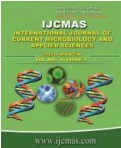


 National Academy of Agricultural Sciences (NAAS)
National Academy of Agricultural Sciences (NAAS)

|
PRINT ISSN : 2319-7692
Online ISSN : 2319-7706 Issues : 12 per year Publisher : Excellent Publishers Email : editorijcmas@gmail.com / submit@ijcmas.com Editor-in-chief: Dr.M.Prakash Index Copernicus ICV 2018: 95.39 NAAS RATING 2020: 5.38 |
Menopause is the period of transition in the life of women during which several physiological changes occurs. This period not only marks the end of reproductive cycle of women but also makes them vulnerable to several chronic diseases such as cardiovascular disease, osteoporosis, diabetes, gastritis, asthmas, liver disease etc. Food and other lifestyle factors greatly affect the health status of post menopausal women. This demands special care and attention to the women during this phase. The present study was carried out in Jorhat city of Assam with a sample size of 100 with the aim to assess the nutritional status of post menopausal women. Simple random sampling was employed for selection of sample. Only those women who have attained menopause were selected for the study. The data from respondents were collected by means of a structured questionnaire and mean nutrient intake of the respondents were recorded by employing 24 hour recall method. The mean age of attainment of menopause among the respondents was 48.58±3.38 years and majority of respondents attained menopause between the ages of 45-50 years. A significant association (p<0.05) of physical activity pattern and BMI with menopausal age of the respondents were observed. Menopausal age was also found to be associated significantly (p<0.05) with diabetes, gastritis and bone disease. The result of dietary assessment showed a poor dietary intake by the women. The mean protein intake was found 47.15 ±19.21 g/day which was 14.27% lower than the RDA. The diet of the respondents were also deficit in minerals with mean calcium, magnesium, phosphorus and iron intake of 479.36 ±183, 116.25±87.39, 519.68 ±165.45 and 17.03±8.34 mg/day. However higher intake of carbohydrate and fat was recorded among the studied population. The study shows that the post menopausal women of Jorhat of Assam have poor nutritional status and therefore requires special attention.
 |
 |
 |
 |
 |